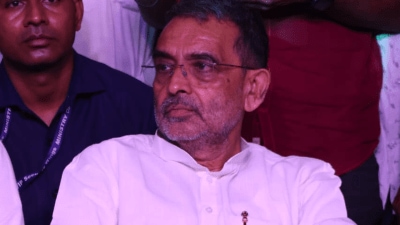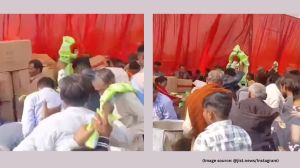‘New AIBA chief brings in breath of fresh air’
Boxing is fairer now, official feels, biases having been eliminated

Despite the “farce” enacted on the last day of the senior national championships by two pugilists, there is a marked improvement in Indian boxing in the last few years. Yet, Indian executive member on the international boxing association (AIBA) Kishen Narsi believes that there is a lot to be done and a long way to go.
However, the former international referee and judge of repute feels there has been a silver lining ever since the change that took place at the top of the AIBA hierarchy last August. With a new president in CK Wu of Taiwan at the helm, the amateur boxing world is looked upon with respect and fair play as the cornerstone of the international body.
“Even in SAF championships our boxers were not able to win medals, forget bigger international events. Today, the scene has changed and Indian boxers cannot be taken lightly. The results over a period of time have proved that,” said Narsi, the lone Indian who has officiated in three Olympics.
The reason, he said, was the difference between the new chief who believes in fair play and the all-powerful fomer chief Anwar Chawdhry of Pakistan, who was expelled from AIBA amid charges of ethical and financial misconduct.
Narsi, a former Maharashtra boxer, said the biggest achievement of Wu after taking charge was to speak to the International Olympic Committee (IOC) to release its annual funding of $ 5,000 each to the AIBA affiliates the world over. The IOC had frozen the money after it found misuse by various national federations, blessed by Chawdhry, across the globe.
“You may say $ 5,000 is not much. But it is huge for small nations like those in the subcontinent — Bangladesh or Sri Lanka — and several others in the world. This money is given for the promotion of the game,” said Narsi.
But more than the money, Narsi felt the new incumbent has brought fair play to the game which is what has allowed lesser nations to win medals in international arena. “The AIBA has set up committees to supervise referees and judges for any malpractice during the championships. They are constantly monitored and warned in case of any discrepancy and finally dismissed. These kinds of steps have not only kept the referees and judges on their toes, but also the countries that nominate them for international meets. It’s no longer the question of sacking a referee here or a judge there. It reflects on the country’s federation that sends him.”
Another good thing to happen is the ‘quota’ system of picking and choosing referees and judges that has been done away with. “The best from among the certified ones gets the chance. It may be one or more from a particular country,” he said.
This, said Narsi, was to eliminate the unfair judgment to boxers. “It’s no longer this boxer or that boxer. In a referee/judge parlance, it is simply the red corner or blue corner boxer.”
And there is a panel of jury members that assesses the mental and physical fitnesss of these referees and judges, said Narsi, adding that the AIBA was now looking at giving greater opportunities to cadet and junior boxers. “That’s where the future of amateur boxing lies,” he said.
To make amateur boxing attractive, the AIBA is thinking of bringing in a change in rules: three rounds of three minutes each instead of the four rounds of two minutes each and, if approved by the AIBA medical commission, even the head gear might go.
“With the head gear on, it doesn’t attract television viewership. But taking the safety aspect into consideration, the AIBA has suggested better hand gloves that can take some pressure off the punches,” he said.



- 01
- 02
- 03
- 04
- 05




























